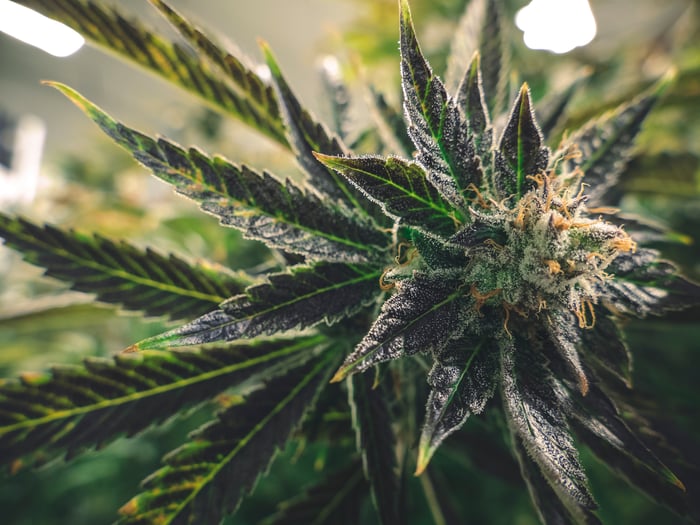You are here
Home 🌿 Marijuana Business News 🌿 3 Marijuana stocks that cost investors billions in 2019 🌿3 Marijuana stocks that cost investors billions in 2019

We now have less than a week to go before we say goodbye to 2019, and the year can't end soon enough for marijuana stock investors.
When 2019 began, the expectation was that this would be the year the cannabis industry really matured. Sales were expected to skyrocket with Canada allowing recreational weed sales and derivative pot products positioned to hit dispensary shelves during the fourth quarter. But as the year played out, these projections turned out to be nothing more than a pipe dream, with the end result being billions of dollars lost by pot stock investors.
Although a few niches within the cannabis industry outperformed, most marijuana stocks lost a considerable amount of their value. The following three pot stocks were especially good at destroying shareholder value, with market cap losses ranging from $2.2 billion to $4.9 billion for the year.
Tilray: $4.85 billion in market cap lost
Talk about a stock coming full circle. After listing its shares at $17 for its initial public offering on the Nasdaq in July 2018, Tilray (NASDAQ:TLRY) wound up seeing its shares spike to as high as $300 on an intraday basis in Sept. 2018, briefly giving the company a value of $26 billion. Yet last week, investors saw Tilray's share price briefly dip below $17, the company's IPO listing price.
The bigger story here is that 2018's hottest stock wound up shedding close to 74% of its value in 2019, losing almost $4.9 billion in market cap.
The big issue for all Canadian pot stocks is the tempered rollout of cannabis products. Regulatory agency Health Canada has struggled to approve licensing applications in a timely manner, while Ontario has been a major buzzkill in that it's slow-stepped the licensing of physical dispensaries. With few avenues to reach consumers in Canada's most populous province, all growers, including Tilray, have struggled mightily.
Making matters worse for Tilray is the perception that its management team has no concrete strategy. In March, for instance, CEO Brendan Kennedy announced that his company would focus future investments on the U.S. and Europe, which seemed an odd decision to make with Canada having launched recreational weed sales just six months prior.
With Tilray in the process of building up its overseas presence and having to spend aggressively to do so, it doesn't look as it'll have a shot at recurring profitability before 2021 or 2022. In short, Tilray's drubbing looks well deserved in 2019.

Aurora Cannabis: $2.59 billion in market cap lost
Another marijuana stock that cost investors billions of dollars throughout the year is Aurora Cannabis (NYSE:ACB). Aurora might be the most-held pot stock by a mile on investment app Robinhood, but popularity doesn't guarantee profits.
Like Tilray, Aurora Cannabis was walloped by the supply struggles experienced in Canada. In fact, in the company's fiscal first-quarter operating results, it announced that it would halt construction at its 1.62-million-square-foot Aurora Sun campus in Alberta and 1-million-square-foot Aurora Nordic 2 grow farm in Denmark to conserve capital and align production with demand. Aurora previously forecast at least 625,000 kilos of annual run-rate production by the end of its fiscal year (June 30, 2020), but its run-rate output has now probably been halved.
Two probably bigger issues that continue to affect the company are its ugly balance sheet and its ongoing share-based dilution. To speak of the latter, shareholders have seen Aurora's outstanding share count catapult from 16 million to around 1.1 billion over the past 21 quarters (five years and three months). With Aurora aggressively expanding its capacity organically and via acquisition, it's regularly used its common stock as capital. Unfortunately, its shareholders have paid the price for that choice.
As for the company's balance sheet, it's lugging around an unsightly $3.17 billion Canadian in goodwill from these acquisitions, which currently represents 57% of its total assets. It looks as if Aurora grossly overpaid for its acquisitions and that a writedown is forthcoming. Add the fact that some folks on Wall Street are genuinely concerned about Aurora's cash position, and you have the perfect recipe for Aurora Cannabis to crush shareholders' dreams in 2019.

Canopy Growth: $2.23 billion in market cap lost
It's probably no surprise that the largest marijuana stock in the world by market cap, Canopy Growth (NYSE:CGC), also had a pretty miserable year. Investors can take solace in the fact that, at least on the basis of market cap, Tilray and Aurora were worse off.
In keeping with the theme, supply chain issues in Canada, coupled with the delayed launch of derivatives -- they were supposed to be on shelves by no later than October, but reached dispensaries only last week -- have ensured that Canopy has had a bad year. But other company-specific issues have dragged down this stock in 2019.
For one, Canopy Growth's income statements have been an utter mess. The company's free-spending ways have led to huge operating losses, even with a number of one-time expenditures removed from the equation. During the fiscal second quarter, Canopy's share-based compensation wound up being higher than its net sales, which goes to show just how bad things are right now.
Somewhat similarly to Aurora, Canopy Growth is carrying CA$1.91 billion in goodwill on its balance sheet, which now accounts for 23% of its total assets. Canopy also looks to have grossly overpaid for its deals, which increases the likelihood of a writedown.
Lastly, among Canadian pot growers, Canopy Growth looks poised to be among the last to generate a recurring profit, primarily because of its aggressive spending, share-based compensation, and international expansion efforts. With Wall Street clearly focused on companies that can generate a profit, there's no guarantee this stock will rebound anytime soon.
420 Intel is Your Source for Marijuana News
420 Intel Canada is your leading news source for the Canadian cannabis industry. Get the latest updates on Canadian cannabis stocks and developments on how Canada continues to be a major player in the worldwide recreational and medical cannabis industry.
420 Intel Canada is the Canadian Industry news outlet that will keep you updated on how these Canadian developments in recreational and medical marijuana will impact the country and the world. Our commitment is to bring you the most important cannabis news stories from across Canada every day of the week.
Marijuana industry news is a constant endeavor with new developments each day. For marijuana news across the True North, 420 Intel Canada promises to bring you quality, Canadian, cannabis industry news.
You can get 420 Intel news delivered directly to your inbox by signing up for our daily marijuana news, ensuring you’re always kept up to date on the ever-changing cannabis industry. To stay even better informed about marijuana legalization news follow us on Twitter, Facebook and LinkedIn.




